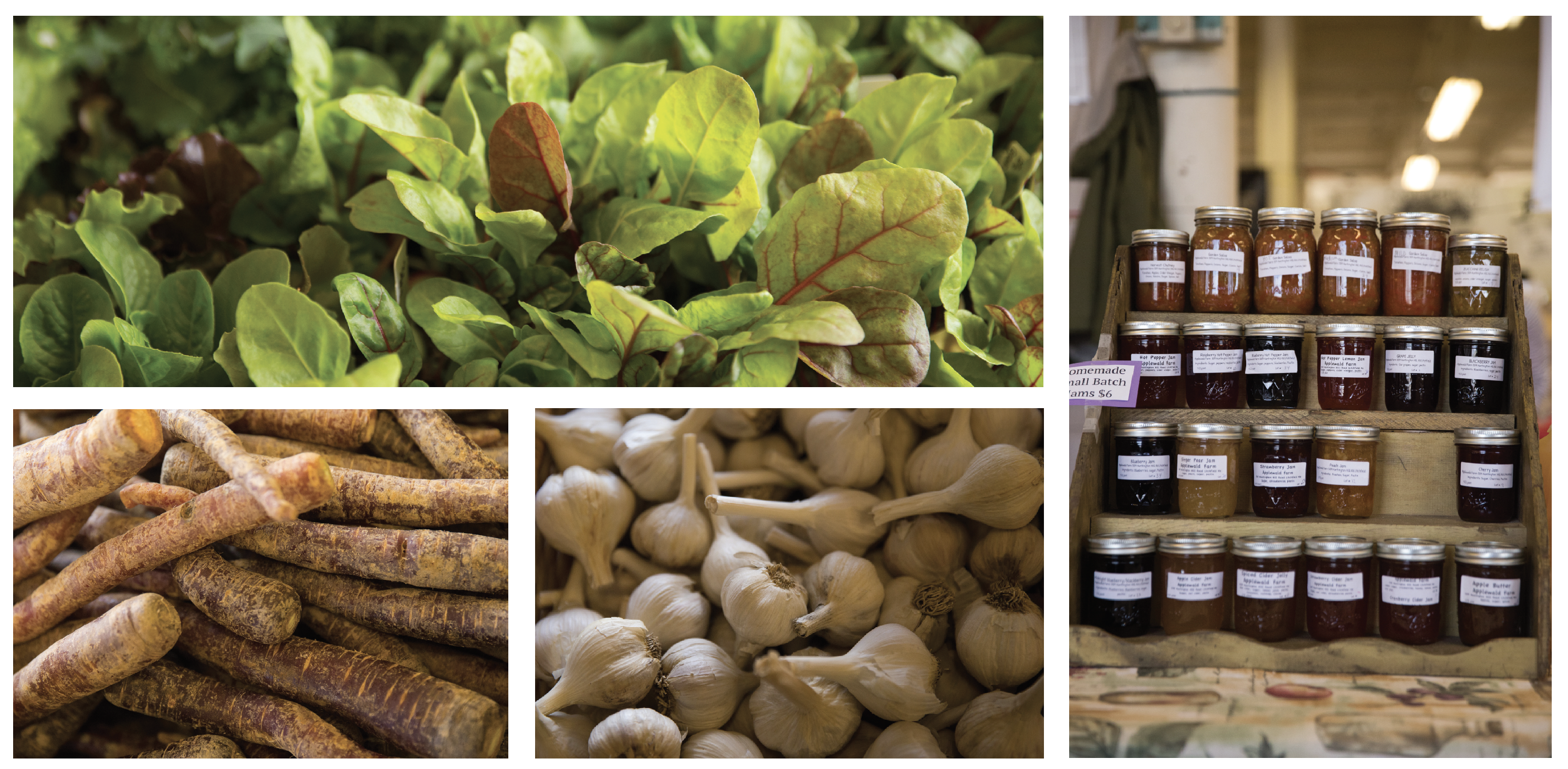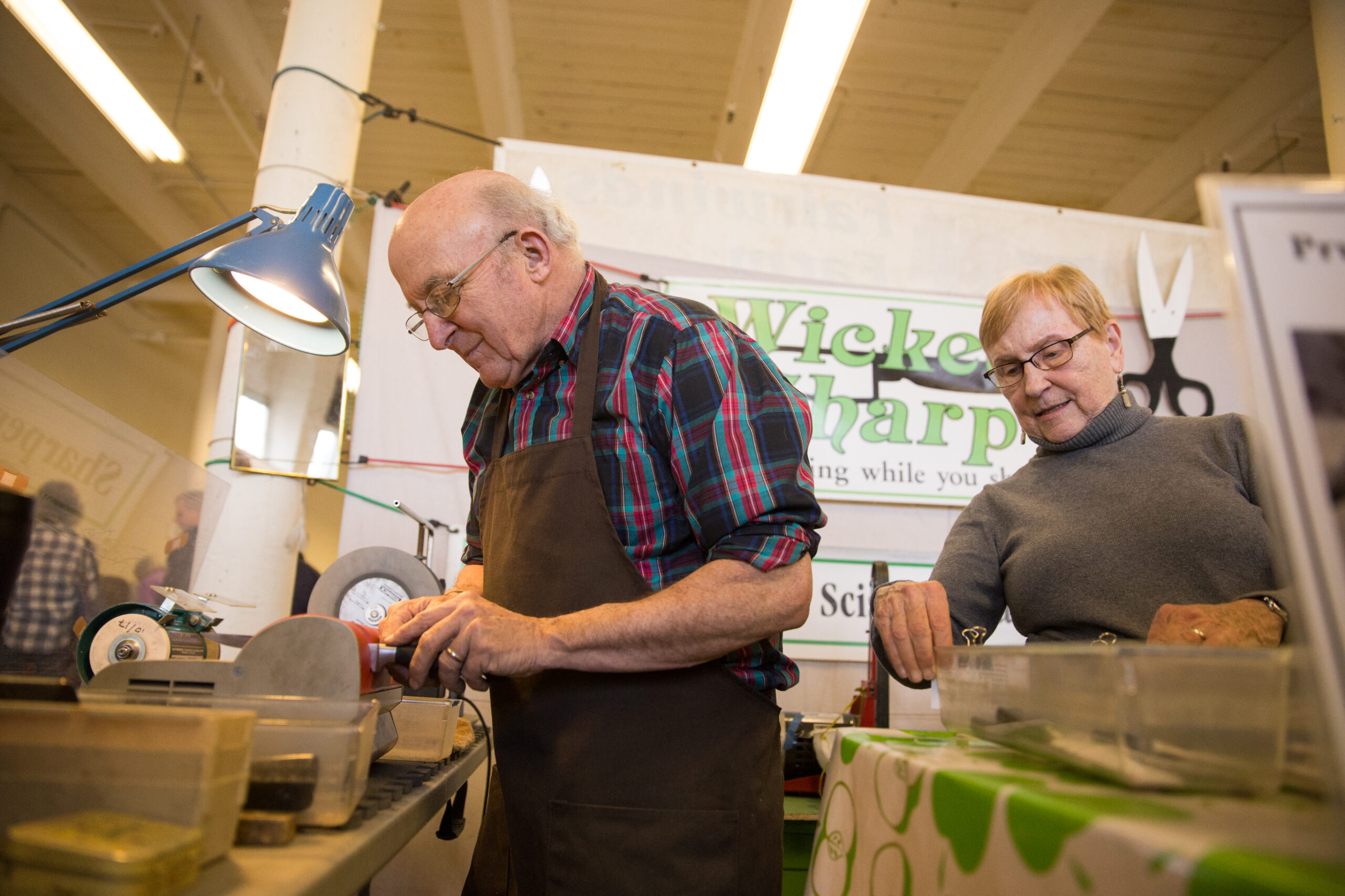Marketing Maine agriculture
The Brunswick Winter Market strives for accessibility, for buyers and sellers
May 9, 2018
 Ann Basu
Ann Basu
Like many others in Maine, the market exudes a strong sense of community and an appreciation for local goods. It also occupies a unique space in one of the more affluent parts of Maine as it attempts to reconcile two statewide trends: the increasing importance of and interest in local agriculture and the persistence of food insecurity.
Eating locally and organic is expensive, which is hard to reconcile with Maine, a state one of the highest rates of food insecurity in the nation.
Six River Farm, an organic vegetable grower in Bowdoinham, strives to make its produce accessible, accepting federal food stamps and vouchers at its stands in several farmers’ markets in and around Brunswick. Its stall in the Winter Market is one of the largest and most popular, spanning several tables piled high with a variety of lettuces, potatoes and more unusual vegetables, like the delicate, mildly-mustardy green tatsoi. There was only a small break in the activity when I could talk to one of the vendors: Ali Briere ’20, a Bowdoin student who started working at Six River last summer.
Ali knew she wanted to work on a farm after going to the Common Ground Fair during the fall of her first year. The fair is an annual celebration of rural living in Maine and local farmers and goods. “This is really special,” she remembered thinking, and she was hooked.
This market–this slice of Maine–Ali said, is “pretty elite.”
“It’s cost prohibitive for people who don’t have a lot of money, which does not represent the culture of Maine because some large percentage of Maine is food insecure,” she said.
A report by the U.S. Department of Agriculture shows that between 2014 and 2016, 16.4 percent of Maine households were food insecure or had limited or uncertain access to enough food, the fifth highest proportion in the nation. According to a 2017 study by the Good Shepherd Food Bank and Preble Street, over 17 percent of residents in Maine’s two northernmost counties, Washington and Aroostook, faced food insecurity. Though the rate was lower in Cumberland County—where Brunswick and Portland are located—at 13.8 percent, it had highest number of food insecure people at 40,330.
Those counties that face the highest level of food insecurity have their own farmers’ markets, and they’re trying to bring more attention to them. The Maine Federation of Farmers’ Markets created a “Washington County Farmers’ Market Trail,” in an endeavor to bring more shoppers up north. But the markets in those highly-food insecure counties are much fewer and farther between than here in Cumberland County, where there are at least four markets within a three-mile radius of Bowdoin’s campus.
The Winter Market has made efforts to include a variety of vendors. Beyond the produce stands, vendors in the Winter Market sell yarn, ceramics and natural beauty products. One of the most specialized stalls in the market is Wicked Sharp. Run by retired husband and wife David and Sara, Wicked Sharp will sharpen your knives, scissors or gardening tools (though David has also done food processor blades, shovels and a tool used specifically to cut reeds for bassoons) while you shop around the market. Offering the service in a farmers’ market, Sara explained, supports the other vendors. It just makes sense, in her opinion, for the produce to go with the tools necessary to prepare it.
 Ann Basu
Ann Basu
“I’m older, so I’ve seen the change over the years, but farmers are different now than they were when I was a kid… They’re not just doing this because their father did it,” she said. They’re also doing it differently, she explained, using organic, slow methods, unlike some big, corporate farms in the Midwest.
The culture within the market is also distinct. Vendors help each other out. They give each other discounts, Sara said, pointing to the Six River Farm’s extensive array of produce across and over a little from Wicked Sharp’s stall. It’s in another corner of the market, but the distance is the only a couple yards. They’re within shouting distance, if you can hear over the din of knife sharpening, vibrant conversation between old friends and ever-changing live music, which today is a one-woman show of folksy violin accompaniment.
Ali agreed that the enclosed setting of the Winter Market sets it apart from other markets.
“Especially in this market, there’s a strong sense of community, and all the vendors know each other,” Ali said. “I think that’s a big thing: everything’s so close since we’re inside. People are closer.”
These parts of Maine’s farmers’ market culture are great, but Ali admitted that it’s a difficult task to reconcile the gap between the market’s goals and the economic reality many Mainers face.
“There are efforts, but I’d say it’s still hard to marry those—the shopping local and not having a lot of money, right?” she said. “Systematically it’s rigged against people who don’t have a lot of money.”
She mentioned Cultivating Community, a non-profit based in Portland, which aims to connect people of all ages with the benefits of farming, offering training and classes as well as affordable produce. She also said that Six River and other farms in the midcoast area donate leftover produce to the food pantry and kitchen at Mid Coast Hunger Prevention Program (MCHPP). Still, Ali said, there’s a world of difference between this market overlooking the river and MCHPP, not even a mile away.
Now that it’s officially spring, the Winter Market will close for the season and many of the vendors will move outdoors. While those markets may feel different from the cozy Fort Andross setting, they all work toward the same goal: connecting vendors, shoppers and a broad appreciation for Maine-made goods. And they’ll still have to work toward making that accessible for all.

Comments
Before submitting a comment, please review our comment policy. Some key points from the policy: